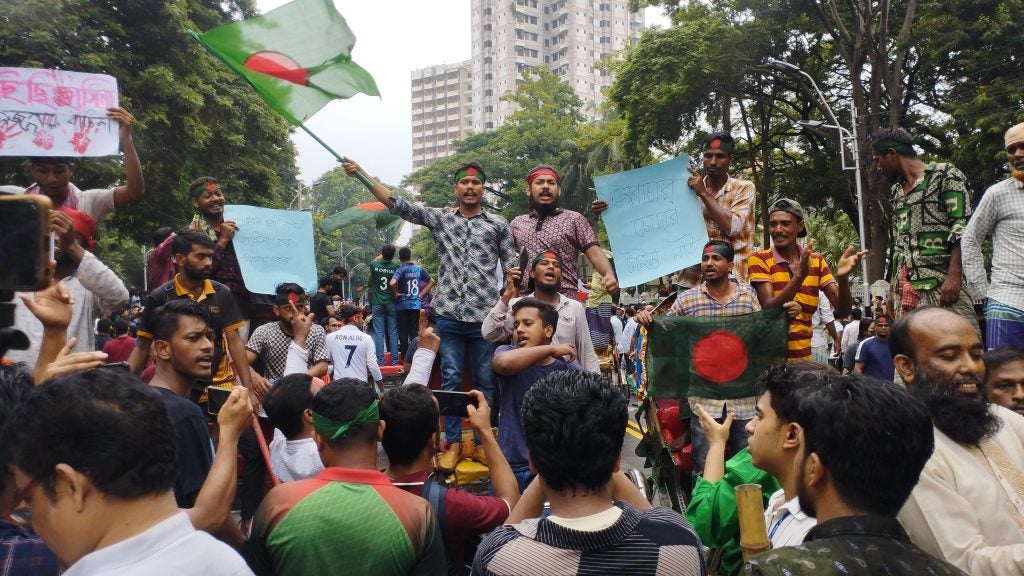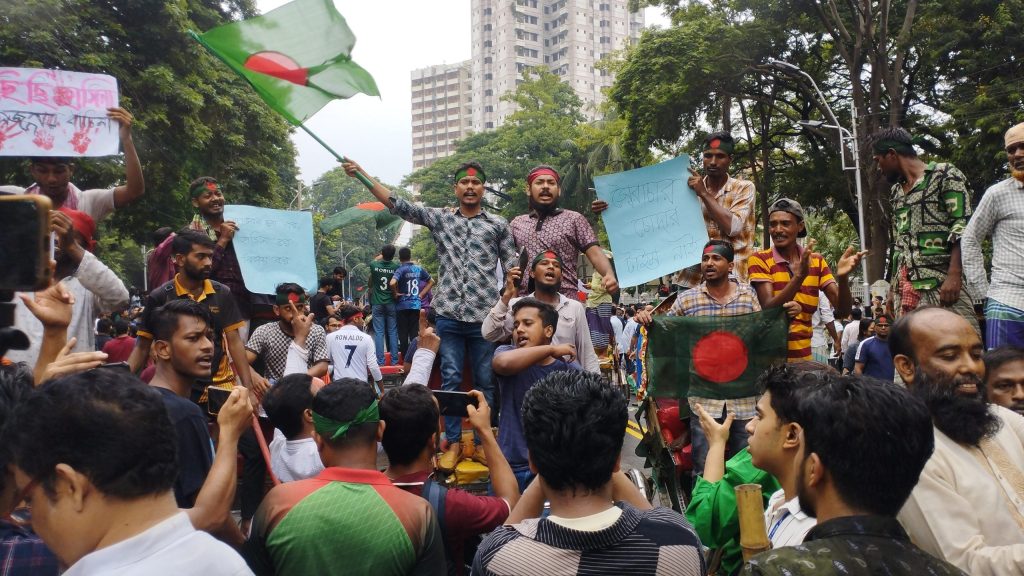
Introduction
The 2024 Bangladesh Quota Reform Movement is rooted in the government’s quota-based employment system, which disproportionately favors descendants of freedom fighters from the 1971 Liberation War. In 2018, a massive student-led protest demanded reforms to the quota system, which reserved most government jobs for various quotas, to ensure greater access for merit-based candidates. In response to the student movement, the government suspended the quota program. In 2024, the High Court of Bangladesh restored the program, triggering further protests calling for Prime Minister Sheikh Hasina’s resignation. Her father having been Bangladesh’s first President, protestors accused Hasina of nepotism and challenged the family’s political grip on the nation. The government responded to these protests with violent crackdowns and remained unwilling to address student concerns.
The reinstatement of the quota system has raised concerns over nepotism and inequality restricting access to merit-based public employment and limiting student career prospects. Student concerns reflect broader frustrations with systemic favoritism and dynastic politics, particularly under the Hasina family. Further, the government’s violent crackdowns and unwillingness to address these grievances have escalated the reform movement into a wider political struggle, uniting diverse groups in demanding transparency, accountability, and a dismantling of entrenched familial dominance in the government.
Hasina’s Coup de Grace
On July 7, 2024, a Bangladeshi investigative journalist found that the Bangladesh Civil Service and other related employment exams had been routinely compromised over the last twelve years. This scandal highlighted the pervasive corruption and inequality in the recruitment process, sparking outrage among students who struggled to receive employment opportunities. Although globally practiced reservation policies generally aim to include economically disadvantaged groups, the Bangladeshi quota system is considered a “rotten system,” rife with “systematic discrimination” that favors a particular political class. The quota system regularly rewards freedom fighters and their families through dedicated benefits in education, healthcare, and employment, such as a 30 percent reservation in government jobs. Moreover, the government’s deadly response to protests has only inflamed protestors as red-themed images mourning the victims of state violence have gone viral on social media platforms. Many saw the High Court’s decisions as Hasina’s thinly veiled political maneuver. The opposition party has labeled the latest general election a “one-woman show,” while scandals of high-profile corruption have challenged her political legitimacy.
As a result, youth activism has become a powerful response to the government’s lack of transparency and responsiveness, signaling a shift in the nation’s political future. Moreover, the movement dealt a considerable blow to the political system’s entrenched corruption, nepotism, and favoritism, which perpetuate inequality and hinder merit-based opportunities. Youth activism has placed younger generations at the center of broader political change, positioning them as both critics of and participants in Bangladesh’s political future.
Future of Youth Leadership in Bangladesh
Bangladesh has a rich historical legacy of youth and student activism, with the 1952 Language Movement in East Pakistan serving as a critical turning point in its national history. Sparked by the imposition of Urdu as the sole state language, the movement saw students leading protests to demand the recognition of Bengali as an official language, reflecting their deep cultural and linguistic pride. Their demands were eventually met in 1956, when Bengali was recognized as one of Pakistan’s official languages, cementing the movement’s success and its symbolic importance in shaping the nation’s identity. This legacy of student activism extended to the 1971 War of Independence, where students played a vital role in organizing resistance, disseminating revolutionary ideas, and participating directly in the struggle for liberation forming a new national identity. Rooted in these defining moments, Bangladesh’s student movements continue to challenge authoritarianism and advocate for democratic governance, demonstrating their enduring significance in the nation’s socio-political evolution.
What began as a student-led protest for reform of the disproportionate quota system quickly escalated into a broader movement calling for systemic change against the political status quo. Scholars, such as Farzana Y. Chowdhury[1], have asserted that the state’s violent suppression diverted the movement into demanding broader political change, most notably Hasina’s resignation. The student movement, however, would not end after Hasina’s resignation. Upon stepping down, student leaders announced that they would not accept a military-led government and would instead support Muhammad Yunus as an interim Prime Minister. Student leaders Nahid Islam and Asif Mahmud joined the Yunus cabinet as advisors on youth unemployment and youth-centered reforms. The student movement’s shift from quota reform to broader demands for systemic change indicates the urgent need for policies that address both youth unemployment and the inequitable distribution of opportunities in Bangladesh.
Youth in Bangladesh are widely recognized as active agents of political change. With Bangladesh’s history of youth activism and the success of the 2024 student movement, it is likely that youth engagement in Bangladeshi politics will continue to endure. In doing so, young leaders carry on the legacy of youth activism in shaping the nation’s democratic future. Despite their successes, it remains to be seen whether this momentum can translate effectively into governance. Aynul Islam[2] notes that it is still too early to evaluate youth persistence in official political capacities, as not enough time has passed to gauge the movement’s longevity and its ability to respond to future crises.
Internal Grievances and External Influences
Rooted in frustrations over nepotism, inequality, and governance failures, the student movement in Bangladesh has primarily focused on addressing internal systemic problems. The movement, however, has not come without criticism and allegations of external influences. As student demands increased, critics described the movement as a “slogan lost in translation”: politically diverted from the primary goal and operated by invisible hands.
Political analysts suspected U.S. involvement in the ongoing student movement. Hasina’s relations with the United States were strained, while the United States welcomed Yunus’ leadership, giving credence to suspicions of external influence. Hasina also asserted that a “white country” had sought to remove her from power over her refusal to align with Western interests. The government and its supporters have also claimed that the Bangladesh Nationalist Party (BNP), a major opposition party, and Jamaat-e-Islami, an Islamist political organization, co-opted the quota reform movement to encourage unrest. While both these organizations oppose Hasina’s consolidation of power under the Awami League, Bangladesh’s oldest political party, her allegations against them lack credible evidence to support her claims of external conspiracy.
Countries with close historical ties to Bangladesh have also provided their input. Harsh Vardhan Shringla, the former Foreign Secretary of India, asserted that anti-nationalists and extremists, including foreign actors, were physically and virtually active in facilitating violence, particularly by spreading misinformation and disinformation on social media. Additionally, the United Kingdom, which once colonized both Bangladesh and India, has urged all sides to end the violence and find a peaceful resolution. Despite the accusations of collusion, the student movement largely views foreign involvement as a potential distraction from their core demands for domestic reforms and justice for building a new Bangladesh. While some perceive foreign support as a form of solidarity, many in the movement see it as undermining the authenticity of their struggle and reinforcing allegations of political manipulation.
Conclusions
The 2024 student movement is a testament to the power of youth activism in demanding a systemic rethinking of Bangladesh’s political landscape. While students have succeeded in challenging the entrenched political establishment, their long-term influence will be shaped by their ability to navigate the complexities of governance and maintain their commitment to reform. As they continue to push for an equitable society, the future of democracy in Bangladesh increasingly depends on the youth movement’s capacity to manage political crises and sustain their vision for a fairer and more transparent system.
Policymakers can enhance youth participation by creating institutional dialogue channels, ensuring representation, and promoting civic education. The 2024 Bangladeshi student movement exposed barriers like distrust in institutions, fear of retaliation, and lack of transparency, which can be addressed through policies ensuring freedom of speech, protection of equal rights and opportunities, and responsive governance. Sustaining youth commitment requires mentorship, clear communication of outcomes, and recognition of their contributions. To stabilize politics, the country must implement trust-building measures, including electoral reforms and anti-corruption initiatives.
Going forward, Bangladeshi policymakers should listen to the demands of students and prioritize merit-based recruitment, dismantling disproportionate quota systems that perpetuate inequality. Transparent and accountable governance structures are essential to restore trust among younger generations and address their concerns. Furthermore, policymakers should facilitate greater youth participation in decision-making processes, recognizing their potential not only as protestors but also as future leaders of a more democratic and representative Bangladesh. These reforms have the potential to foster a more inclusive, responsive, and dynamic democracy, enhancing Bangladesh’s potential for long-term stability and growth while mitigating the risks of further unrest.
. . .
Yog Raj Lamichhane is an Assistant Professor at the School of Business, Faculty of Management Studies, Pokhara University, Nepal. He has 14 years of experience in higher education. He actively contributes to academic research, with publications in both national and international journals. His research interests include youth activism, resistance, trauma studies, and autobiographical writing.
[1] Farzana Y. Chowdhury, online interview by author, 21 October 2024
[2]Aynul Islam, e-mail message to author, 18 October 2024.
Image credit: Mohammad Tanbiruzzaman Koushal, CC BY-SA 2.0, via Flickr.





